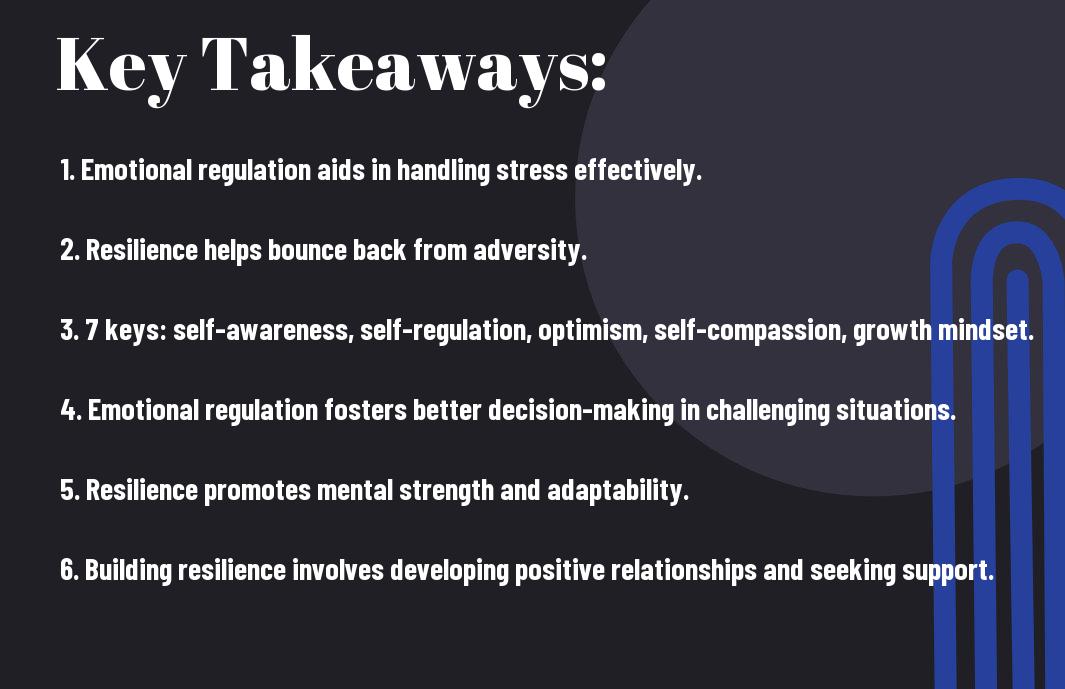Why Is Emotional Regulation Important For Building Resilience? What Are The 7 Keys To Resilience?
You understand the importance of resilience in navigating life’s challenges. Embracing emotional regulation as a key component of resilience can significantly impact your ability to bounce back from adversity. By mastering the art of managing your emotions effectively, you can build a solid foundation for resilience. There are seven vital keys to resilience that can empower you to navigate life’s ups and downs with grace and strength. Let’s probe how emotional regulation plays a crucial role in cultivating resilience, and explore the seven keys that can help you thrive in the face of adversity.
Key Takeaways:
- Emotional regulation is crucial for building resilience as it helps individuals manage and bounce back from difficult situations effectively.
- Self-awareness is one of the 7 keys to resilience, allowing individuals to recognize their emotions and understand how they impact their thoughts and behaviours.
- Mindfulness is another key to resilience, which involves staying present in the moment and not getting overwhelmed by negative emotions or stress.
- Optimism plays a significant role in resilience by helping individuals focus on the positive aspects of a situation and believe in their ability to overcome challenges.
- Supportive relationships are important for resilience as they provide individuals with emotional support, encouragement, and a sense of belonging during tough times.

The Importance of Emotional Regulation
Little is more important in building resilience than the ability to regulate our emotions. Emotional regulation involves our capacity to manage and respond to an emotional experience in a healthy and balanced way. It enables us to navigate through life’s challenges with more resilience and adaptability.
Managing Stress and Anxiety
Anxiety can be a significant barrier to building resilience as it can overwhelm our ability to cope with stressors effectively. By practising emotional regulation, individuals can learn to identify, understand, and manage their anxiety triggers. This awareness allows for the development of coping strategies and problem-solving skills to reduce anxiety levels and build resilience in the face of adversity.
Enhancing Personal and Professional Relationships
With enhanced emotional regulation skills, individuals can foster deeper connections and healthier boundaries in their personal and professional relationships. By effectively communicating emotions and needs, setting boundaries, and expressing empathy, individuals can build trust and create supportive environments that nurture resilience.
To further enhance personal and professional relationships, individuals can practice active listening, empathy, and conflict resolution skills. These effective communication strategies can help cultivate understanding, trust, and collaboration, leading to stronger and more resilient relationships.
Building Blocks of Resilience
Developing a Positive Outlook
Building a positive outlook is crucial for developing resilience. It involves reframing negative situations, focusing on strengths, and cultivating a mindset of optimism. By practising gratitude, mindfulness, and self-compassion, individuals can train their minds to see challenges as opportunities for growth. This shift in perspective can help in bouncing back from setbacks with a renewed sense of determination and resilience.
Fostering Strong Social Connections
One of the key pillars of resilience is having strong social connections. Building a support network of family, friends, and peers provides a sense of belonging and creates a safety net during tough times. Social connections offer emotional support, practical assistance, and different perspectives that can help individuals navigate challenges more effectively. Research shows that people with strong social ties are better equipped to cope with stress and adversity, making them more resilient overall.
The strength of our social connections can greatly impact our ability to bounce back from difficult situations. Whether it’s seeking advice from a trusted friend, sharing our feelings with a supportive family member, or simply knowing that we have someone to lean on in times of need, strong social connections play a vital role in building resilience.
The 7 Keys to Resilience
Self-Awareness
For individuals to build resilience, self-awareness is crucial. It involves recognizing and understanding one’s emotions, thoughts, and behaviours. By being aware of these internal processes, individuals can better manage stress, make informed decisions, and build healthier relationships.
Mindfulness
With mindfulness, individuals focus on the present moment without judgment. It involves being fully aware of thoughts, feelings, sensations, and the environment. Mindfulness practices, such as meditation and deep breathing, can help reduce stress, enhance self-awareness, and improve overall well-being.
Keys to practicing mindfulness include setting aside dedicated time each day for meditation, focusing on the breath to anchor oneself in the present moment, and practicing non-judgmental awareness of thoughts and feelings.
Self-Care
Self-care is crucial for resilience as it involves taking care of one’s physical, emotional, and mental well-being. This includes getting enough rest, eating nutritious foods, engaging in exercise, and setting boundaries to protect one’s energy and time.
It is important to prioritize self-care practices such as practicing self-compassion, setting realistic goals, and seeking support from others when needed.
Positive Relationships
Mindfulness in relationships involves being fully present and attentive when interacting with others. It includes active listening, empathy, and effective communication. Cultivating positive relationships provides emotional support, enhances self-worth, and promotes resilience.
Plus, maintaining healthy boundaries, expressing gratitude, and resolving conflicts constructively can strengthen relationships and foster resilience.
Purposeful Goal Setting
Any individual looking to build resilience should engage in purposeful goal-setting. This involves setting specific, achievable goals that align with one’s values and aspirations. By having clear objectives, individuals can stay motivated, focused, and resilient in the face of challenges.
Goal setting includes breaking down big goals into smaller tasks, tracking progress regularly, and celebrating achievements along the way to stay motivated and build resilience.
Flexibility in Thinking
Self-awareness in flexible thinking allows individuals to adapt and respond effectively to changing circumstances. It involves challenging negative thought patterns, considering alternative perspectives, and finding creative solutions to problems. Being flexible in thinking promotes resilience by fostering adaptability and reducing rigidity in responses to challenges.
Resilience is not about avoiding challenges but about developing the skills and mindset to navigate them successfully.
Proactive Problem Solving
Solving problems proactively is crucial for resilience as it involves anticipating challenges, developing contingency plans, and taking proactive steps to address issues before they escalate. By being proactive, individuals can mitigate the impact of potential stressors and build confidence in their ability to overcome obstacles.
Problem-solving strategies include breaking down problems into smaller parts, brainstorming potential solutions, and evaluating the effectiveness of each solution to build resilience and enhance problem-solving skills.

Strategies for Improving Emotional Regulation
Cognitive Behavioral Techniques
Emotional regulation is crucial for resilience, and cognitive behavioural techniques are powerful tools to enhance this skill. By identifying and challenging negative thought patterns, individuals can reframe their perspectives and build resilience. Through techniques such as cognitive restructuring and thought-stopping, individuals can learn to manage their emotions effectively and respond to challenging situations with clarity and composure.
Mindfulness and Meditation Practices
Behavioural
This subsection explores the value of mindfulness and meditation practices in improving emotional regulation and resilience. Mindfulness involves being fully present in the moment without judgment, while meditation focuses on cultivating a calm and focused mind. These practices help individuals develop self-awareness, regulate their emotions, and reduce stress levels. By incorporating mindfulness and meditation into their daily routine, individuals can enhance their emotional intelligence and build resilience in the face of adversity.
This emphasis on mindfulness and meditation is supported by research indicating that these practices can rewire the brain, improving emotional regulation and enhancing overall well-being. By engaging in regular mindfulness and meditation exercises, individuals can create a strong foundation for resilience, enabling them to navigate life’s challenges with strength and grace.
Overcoming Challenges to Emotional Regulation
Identifying and Addressing Triggers
Many challenges can arise when trying to regulate emotions, with one common obstacle being identifying and addressing triggers. These triggers can vary from person to person but often stem from past experiences, current stressors, or specific situations that evoke strong emotions. Addressing triggers involves self-reflection, awareness of patterns, and developing coping strategies to manage emotional responses effectively.
Seeking Professional Support When Needed
The ability to regulate emotions can be complex, and there may be times when external help is needed to navigate challenges effectively. Seeking professional support, such as therapy or counselling, can provide individuals with valuable resources and tools to enhance emotional regulation skills. Therapists and mental health professionals can offer guidance, support, and specialized techniques tailored to individual needs, fostering personal growth and resilience.
To build resilience and improve emotional regulation, it is important to acknowledge when professional support is necessary. Therapists and mental health professionals are trained to provide evidence-based interventions that empower individuals to manage emotions, overcome obstacles, and cultivate resilience effectively. Seeking help is a sign of strength and a proactive step towards building a solid foundation for emotional well-being.
Summing up
Upon reflecting on why emotional regulation is important for building resilience, it becomes evident that the ability to manage emotions effectively is vital for adapting to challenging situations and bouncing back from adversity. The 7 keys to resilience include fostering strong relationships, cultivating optimism, practising self-compassion, developing problem-solving skills, engaging in self-care, seeking support, and maintaining a sense of perspective. By incorporating these strategies into our lives, we empower ourselves to navigate life’s ups and downs with greater strength and flexibility.
FAQ
Q: Why is emotional regulation important for building resilience?
A: Emotional regulation is crucial for building resilience because it helps individuals effectively manage their emotions in the face of adversity. By regulating emotions, people can navigate through challenges, maintain a sense of control, and bounce back from setbacks with greater ease.
Q: What are the 7 keys to resilience?
A: The 7 keys to resilience are: 1) Self-awareness, 2) Mindfulness, 3) Optimism, 4) Adaptability, 5) Social support, 6) Problem-solving skills, and 7) Emotional regulation. These key factors work together to help individuals develop the ability to cope with stress, overcome obstacles, and thrive in the face of adversity.
Q: How does self-awareness contribute to resilience?
A: Self-awareness plays a crucial role in resilience as it involves understanding one’s emotions, thoughts, strengths, and weaknesses. By being self-aware, individuals can better identify their triggers, manage stress effectively, and make informed decisions during challenging times, ultimately enhancing their resilience.
Q: Why is social support important for resilience?
A: Social support is vital for resilience because having a network of supportive relationships can provide individuals with encouragement, guidance, and a sense of belonging. Strong social connections can help people cope with stress, build resilience, and recover from setbacks more quickly.
Q: How can mindfulness help in building resilience?
A: Mindfulness practices, such as meditation and deep breathing, can help individuals cultivate present-moment awareness, reduce stress, and enhance emotional regulation. By being mindful, people can develop a greater sense of clarity, focus, and resilience in the face of life’s challenges.